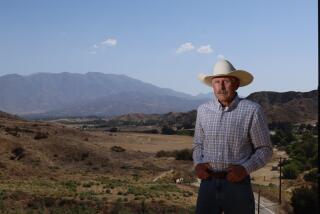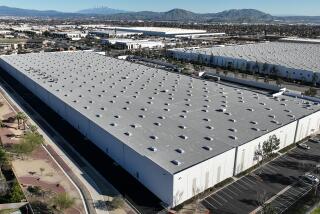SCRAP RACKET : Meeting Set by Homeowners Who Shake as Old Iron Rattles and Trucks Roll
- Share via
The high-voltage magnet, six feet in diameter, danced from a crane above a pile of HMS --scrap yard talk for heavy melting steel. Discarded pipe valves jumped up and clung to the giant magnet, which deposited them on a scrap pile with a thunderous clatter.
It was Wednesday at the Hiuka America Corp. in San Pedro. Nearby at the Port of Los Angeles, the Silver Clipper, 600 feet long and bound for the Hyundai Corp. in South Korea, was loading her cargo--25,000 tons of Hiuka America’s scrap.
All day at Hiuka, steel had been clattering and trucks had been rumbling--down a steep hill toward Gaffey Street and 3.5 miles to the docks. As is the scrap storage company’s custom when a ship is in port, the loading began at 6:30 a.m. and would not cease until 3 the following morning.
On the other side of Gaffey Street, Sal Pardo could hear it all.
And therein lies Hiuka’s problem.
Pardo, president of the Rolling Hills Highlands Neighborhood Assn., and other San Pedro residents have been trying for more than 18 months to get Hiuka to leave Gaffey Street or scale back its late-night operations. Residents complain the company makes noise that carries into the hills, that it shines bright lights late at night, and that its 14-acre scrap yard, which abuts the Harbor Freeway, gives visitors a poor first impression as they enter this seaport community.
“You want to have quiet--you can’t,” said Pardo, who can see the scrap yard from his backyard. “You want to read a book--you can’t. It takes concentration to ignore it.”
Hiuka insists it is trying to be a good neighbor. Last week, the company erected a 10-foot, redwood fence along the freeway to block the scrap yard from view. It has rearranged its scrap piles so that heavy steel, which makes the most noise, is dumped away from residential areas. Company President David Creigh said county tests showed that the company did not violate noise regulations. Creigh also said the company tries to complete its noisiest work by 10 p.m.
“We have significantly reduced the noise to the point that we are receiving congratulatory phone calls,” he said.
Neighbors agree that some progress has been made. But despite that, a meeting of the San Pedro and Peninsula Homeowners Coalition is set for Sept. 28 to discuss Hiuka.
The coalition, which represents 20 neighborhood associations, one of them Pardo’s, will consider asking the city to place zoning restrictions on the land Hiuka leases--a move that would force the company out in five years.
Flores Will Respond
A spokesman for Councilwoman Joan Milke Flores, who represents the harbor district, said Flores will follow the coalition’s advice. If the coalition favors the zoning amendment, Flores will introduce a motion--a draft has already been prepared--to the City Council.
Coalition President Noah Modisett said he has no idea how the vote will go.
That Hiuka America is permitted to operate at 2100 Gaffey St. at all is an accident, the result of a loophole in city law.
When, in 1984, a zoning ordinance was passed to bring San Pedro into compliance with its community plan, the Gaffey Street land was zoned for heavy industrial with certain restrictions. Automobile dismantling yards and junkyards were specifically prohibited.
According to David Kuntzman, a planning assistant for the city, the authors of the ordinance intended to prohibit scrap storage operations like the one Hiuka runs.
But a challenge and subsequent appeal under the zoning law, waged by Flores’ office last year, produced rulings that deemed Hiuka a scrap storage yard--as distinct from a junkyard or a scrap processing operation--that was within the bounds of the code. The matter cannot be appealed further.
No Space Near Harbor
Flores and others have said Hiuka should be closer to the port, so its trucks would not have to travel past residential streets to get to the ships. Hiuka president Creigh said the company “would move tomorrow to a facility at the harbor (but) there is just apparently no space available.”
Now, amending the zoning ordinance appears to be the only legal recourse for the neighbors. If an amendment were passed by the City Council, Kuntzman said, Hiuka would be classified as a nonconforming use and would have five years from the date of passage to leave.
The zoning law does provide for extensions of the five-year period if a company makes substantial improvements on its land. Although Hiuka is putting up an office building--a move that has some residents concerned--Kuntzman said the building would not be considered a substantial improvement.
Kuntzman, who said Hiuka is trying to be a good neighbor, suggested the homeowners might explore the possibility of amending the zoning ordinance to “put in some type of trigger” that would permit Hiuka to stay as long as it met certain conditions. The company could then remain on Gaffey Street past the five-year mark, as long as it continued to observe the restrictions.
However, he said, “I think there needs to be a real exploration of whether, even if Hiuka did everything they could, whether that would be enough to mitigate all the impacts. . . . The best-case scenario for the neighborhood would be to have the five-year clock running.”
Creigh said that regardless of whether the zoning amendment goes through, his company will continue trying to improve its standing with the neighborhood.
“I’m not going to go to my grave realizing that . . . I helped make somebody’s life miserable,” he said. “Life is just too short to be an obnoxious and uncooperative neighbor.”
As to whether Hiuka would fight the zoning amendment, Creigh hinted that the company would, but stopped short of saying that it would take the city to court. “Of course,” he said, “we’ve made an investment there and we’re in business and we would do what we could to protect our investment.”
Pardo, Modisett and other neighbors say they have no doubt that Hiuka is trying its best to make improvements. Of the residents, Pardo is among the most vocal in demanding that Hiuka leave.
In the dining room of his Barrywood Avenue home, he keeps blueprints of an industrial park that abuts his property, and a promotional photo for the California Drive-In Theater company, directly adjacent to his home.
“We want business up there, but like this,” he said, pointing to the photo. “Light industrial. Something beautiful. Something that doesn’t make noise.”
More to Read
Sign up for Essential California
The most important California stories and recommendations in your inbox every morning.
You may occasionally receive promotional content from the Los Angeles Times.










